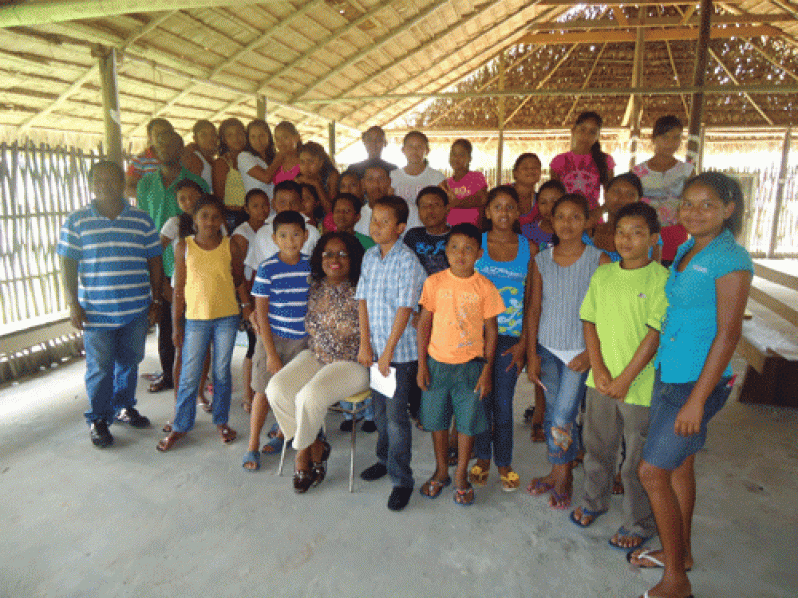A TWO-day holiday camp organized by the Faith Harding Quick Impact Programme was recently held at Moraikobai, Mahaicony Creek.  Teenagers were the targeted participants, and topics covered dealt with issues that would bring indigenous children successful adult livelihoods. There was a special focus on building self-esteem, and avoiding teenage pregnancy; understanding and protecting oneself from HIV and AIDS, and other sexually transmitted diseases; understanding the effects of substance abuse; and being able to heal from the hidden wounds and bruises of child abuse.
Teenagers were the targeted participants, and topics covered dealt with issues that would bring indigenous children successful adult livelihoods. There was a special focus on building self-esteem, and avoiding teenage pregnancy; understanding and protecting oneself from HIV and AIDS, and other sexually transmitted diseases; understanding the effects of substance abuse; and being able to heal from the hidden wounds and bruises of child abuse.
Director of the Faith Harding Quick Impact Program, Dr. Faith Harding, travelled to the community to spend the two days with the residents, and to interact with the teenagers.
The sessions sought to find effective ways of removing stumbling blocks that prevented those teenagers from achieving their desired objectives.
Cognizant of the effect of peer pressure which perennially stalks every youngster, the conversations dealt with successfully combating issues that affect young minds, threaten self-esteem and challenge confidence.
Conversations dealt with the many invitations and enticements the youths face to engage in inappropriate sexual activities; their failure to secure secondary education for obvious reasons; and the issues of suicide, substance abuse, and many of the ills of society that surround them in today’s ever changing world environment.
After numerous interactive sessions, the youths better understood what it entailed to have respect for themselves, and to demand the right that to be respected. They were made to understand that the power to be whatever they wanted to be was in their very own hands, and that everything was possible with hard work.
Dr. Faith Harding told them that while teenage pregnancy was ordinarily very hard for a young woman to deal with, there were other spin-offs that exacerbated the situation for troubled teens.
Girls who fall into teenage pregnancy also have to struggle with family conflicts, abusive behaviours, abrupt changes in personality, and sometimes the total disregarding of rules, which by itself creates more issues.
The blame game is then played out in which no one wants to take responsibility for contributing to the problem: there are displayed uncontrollable anger, controlling emotions, and blanked-out minds; there are manipulative, lying, stealing, sneaky behaviours; and sometimes parents are pitted against each other.
The QIP group of youngsters was reminded that HIV is not a disease specific to one group, population, or ethnicity, as it affects both sexes, all ages, and all socioeconomic groups; and teenagers are no exception.
Further, teenagers are a very underserved and muted group in many communities, as it relates to HIV/AIDS and other diseases. But the group was much informed on the transmission of the disease, the risks, and how to avoid them.
The teenagers were also told that children who have been abused often suffer severe emotional damage, which does not always surface until teenage years or later.
They were told that abuse is demonstrated in aggressive, disruptive and sometimes illegal behaviours; self-abusive behaviours; suicidal thoughts; sexual aggressiveness; inability to trust or love others; symptoms of depression; drug and alcohol abuse and sleeping disorders.
The note was made that substance abuse interferes with normal brain functioning, causing the brain to change and remember intense feelings of pleasure. In short, it changes the physical structure of the brain, and can properly be deemed a brain disease.
An addict’s brain has changed to a point where normal life cannot give that person pleasure, the youths were told.
The youths were warned that, in most cases, the decision to start using drugs is usually voluntary, but becomes involuntary as people keep using the substances, which then becomes hard for them to overcome and which eventually leads to addiction.
Dr. Faith Harding, QIP, host two-day interactive camp at Moraikobai
SHARE THIS ARTICLE :
Facebook
Twitter
WhatsApp



.jpg)








